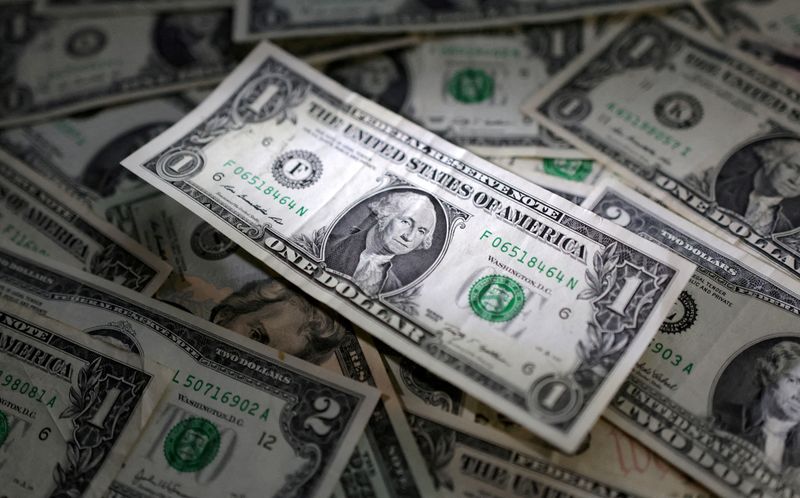Dollar rallies after Fed signals rate hikes; yuan, kiwi slide
2023.06.15 02:15

© Reuters. FILE PHOTO: U.S. dollar banknotes are seen in this illustration taken March 10, 2023. REUTERS/Dado Ruvic/Illustration/File Photo
By Rocky Swift
TOKYO (Reuters) – The U.S. dollar rallied in Asian trading on Thursday after the Federal Reserve signalled rate hikes later in the year, while China’s and New Zealand’s currencies fell on signs of weakness in those economies.
The market’s attention is now turning to other central bank decisions late this week, with the yen sliding to its weakest this year as the Bank of Japan begins its two-day policy meeting.
The rose 0.4% to 103.35, recovering from a four-week low of 102.66 on Wednesday after the Fed held interest rates steady as expected but signalled that borrowing costs would increase by another 50 basis points (bps) by end-December.
The European Central Bank announces its next rate decision on Thursday, with markets pricing in a 25 bps hike and another in July before a pause for the rest of the year.
The Bank of Japan follows on Friday, when it is expected to maintain its ultra-dovish stance and yield curve control settings.
“In light of what the Fed has announced, it’s a hawkish pause,” said Bank of Singapore currency strategist Sim Moh Siong. “The message here is that the Fed is tightening, and this is why I think the dollar itself could stay supported in the near term.”
The euro lost 0.12% to $1.0808, but against Japan’s currency it surged 0.71% to 152.785 yen.
The yen plunged 0.9% to 141.365 per dollar, and earlier touched 141.430, a level not seen since Nov. 23.
Japan’s top government spokesperson said on Thursday that volatile currency market moves were undesirable and authorities would take “appropriate” action as needed.
The dollar sank 0.52% to $0.6177 after data showed New Zealand’s economy slipped into a technical recession in the first quarter, putting further rate hikes in doubt.
slid 0.05% and touched 7.1916 per dollar, the weakest since November, after the People’s Bank of China (PBOC) cut the borrowing cost of its medium-term policy loans for the first time in 10 months.
That followed a reduction in the PBOC’s short-term policy lending rate on Tuesday, and analysts widely expect a cut in the country’s benchmark rates next week.
“Following the rate cut from earlier this week, there’s a lot of expectation for more wide ranging stimulus to shore up the economy,” said Bank of Singapore’s Siong.








